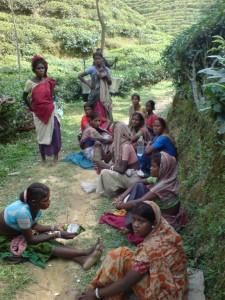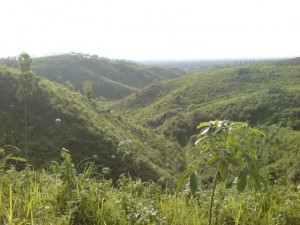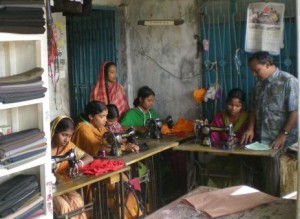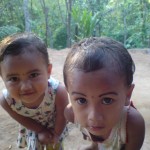Meet Boniface Gomes and Father James Kiron
 Dave and I were a little weary about going to Bangladesh. The travel blogs we read had nothing good to say about Dhaka and we just didnûôÂûÂãô˜ûÂãôÂt know what we were getting ourselves into by signing up to go visit a tribal village in Sirmangal.
Dave and I were a little weary about going to Bangladesh. The travel blogs we read had nothing good to say about Dhaka and we just didnûôÂûÂãô˜ûÂãôÂt know what we were getting ourselves into by signing up to go visit a tribal village in Sirmangal.
But for me, the visit in Bangladesh has been the highlight of the trip so far! Boniface, the director of the NGO Bangladesh Association for Sustainable Development (BASD), greeted us and got us set up in a nice hotel. We had a great discussion on the bus ride to the village. Boniface has been a freedom fighter and has a Masters in Divinity. A curious combo! He is devoted to his country and the betterment of the local people. Boniface started the NGO with the help of family and friends supporting him. Together they have created successful microcredit programs and skills training workshops, where staff work very standard of living. Progress is made slowly and deliberately through talking, sharing and education programs. The local people are given the responsibility to take on decisions for themselves and in time, learn to run the programs without the support of BASD. This is truly noble work!
 The bus ride was a harrowing experience on the nerves, weaving and honking wildly down the road. Then we transferred to a jeep to take us up to the tea gardens and really tested the torque on steep and rough inclines up to the tribal village. The view is of tall hills of short green bushes in neat rows. Along the road are white adobe houses with cows and chickens wandering around.
The bus ride was a harrowing experience on the nerves, weaving and honking wildly down the road. Then we transferred to a jeep to take us up to the tea gardens and really tested the torque on steep and rough inclines up to the tribal village. The view is of tall hills of short green bushes in neat rows. Along the road are white adobe houses with cows and chickens wandering around.
Father James has a grey beard and kind eyes. He and Boniface joke with each other. We walk down the path to his house past small signs that say peace, unity, love in Bangla. Father James left the city life to live in the forest and build his own homestead. He built a fine adobe house with a tin roof and solar panels for light. The washroom is outdoor and washing and drinking water are carried from the bottom of the hill. The weather is hot 35 or more at midday. He has studies permaculture principles and is planting lots of fruit trees and vegetables around his property and digging ponds to try to keep the monsoon waters around to do good for the soil. He is a bit of a witch doctor concocting eco insect repellents and fertilizers from the locally available plant life. While we were visiting, we got to cut the ribbon on the new composting toilet! He is working to make the construction affordable for the people. He also took us down to the tea garden village where people were participating in a microloan program. We saw two girls get loans for 2000 takka to buy goats. When the goat has a kid, it can be sold to generate income for the family. The loans are paid back a little each week and the interest rate is a little better than the Bank. If someone cannot repay for a little while, the property is not taken from them. Instead they work out arrangements to pay in the future or take it out of their savings. We also visited the home where a village girl is teaching others how to sew using foot operated sewing machines. This helps the girls have an income generating skill and helps them attract a good husband.
We saw two girls get loans for 2000 takka to buy goats. When the goat has a kid, it can be sold to generate income for the family. The loans are paid back a little each week and the interest rate is a little better than the Bank. If someone cannot repay for a little while, the property is not taken from them. Instead they work out arrangements to pay in the future or take it out of their savings. We also visited the home where a village girl is teaching others how to sew using foot operated sewing machines. This helps the girls have an income generating skill and helps them attract a good husband.
These programs make a big difference in the lives of the poorest people in the worldûôÂûÂãô˜ûÂãôÂs poorest country. These men may be living lightly. But they are making a big impact!!

